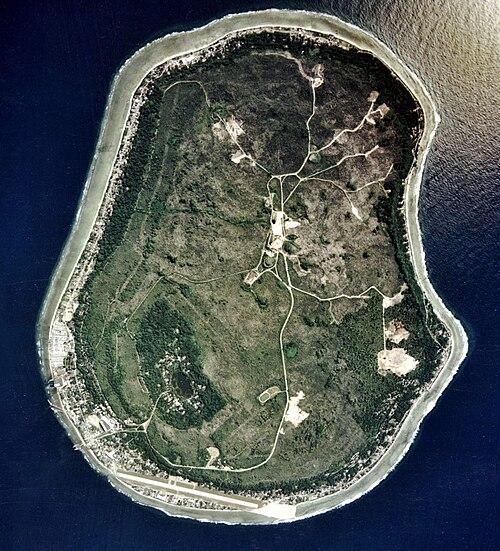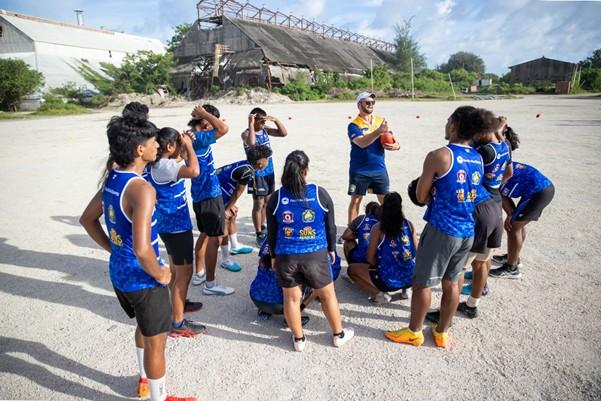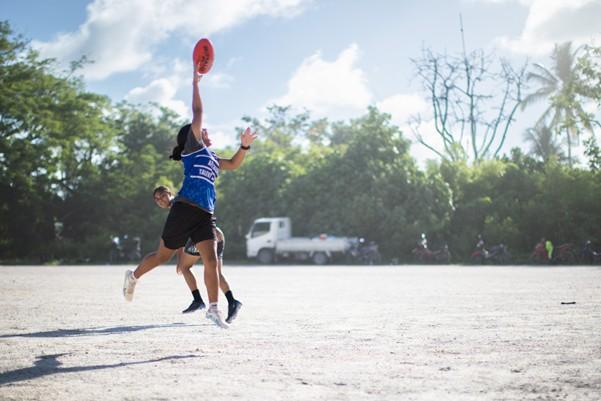Facts and figures
| Official name | Republic of Nauru |
| Country code | NR |
| Area | 21km2 |
| Population | 11,919 |
| Capital city | Yaren (de facto) |
| Timezone | UTC+12 |
| GDP | $USD 0.15 billions |
| Currency | AUD (Australian dollar $) |
| Government type | Unitary parliamentary republic with an executive presidency under a non-partisan democracy |
The ‘Know Your Region’ series is designed to support unit and individual professional military education on the Indo-Pacific region. It’s important for all serving members of our military to have a foundational knowledge of the countries and issues in the Indo-Pacific.
On this page:
- Summary
- A short history
- People and society
- Customs and traditions
- Media and Internet
Nauru is a small Pacific Island nation approximately 50 kilometres south of the Equator, 800 km east of the Solomon Islands and 3,000 kilometres north-east of Australia.
With an area of only 21 square kilometres, Nauru is the third-smallest country in the world, larger than only Vatican City and Monaco.
The population is approximately 12,025 (2025). Nauru does not have a capital city; however, government offices are in the Yaren District, which is also home to the only international airport. The national flag features a horizontal line representing the Equator with a white star right beneath it indicating where Nauru lies.
The island is a raised coral atoll with a central plateau surrounded by a fertile ring of land. The highest point on the island reaches only 61 meters above sea level. The coastline has steep cliffs and a narrow fringing reef.
The land was once fertile; however, decades of phosphate mining have left large areas of the island scarred, with the central plateau now largely devoid of vegetation.
The country has scarce arable land and fresh water so residents must import more than 90% of food. A diet heavy in processed and canned food that are high in salt, sugar, and artificial ingredients has contributed to one of the world’s highest obesity rates and an average life expectancy of only 67 years.

Image; Satellite image of Nauru, 2002 – Wikipedia
A Short History
Nauru's was first settled by Micronesian and Polynesian peoples around 3,000 years ago. It was first recorded by Europeans in 1798 by an English sailing vessel. During the 1830s the island became a port of call for whaling ships. Not long after, European traders began to establish a presence.
The discovery of rich phosphate deposits in the late 19th century transformed Nauru's economy, However, over-reliance on a single resource and the damage caused by extensive mining led to economic turmoil. Japan seized the island during WWII but were later expelled by Australia, who then took administrative control. Nauru was granted independence in 1967, with January 31, 1968, chosen as Nauru’s Independence Day.
People and Society
The official language of Nauru is Nauruan, a distinct Austronesian language. No written grammar of the language has been compiled, and its relationships to other Micronesian languages is not well understood. English is widely spoken and is used by the Government and in schools.
Religion plays an important role in daily life with the majority of people identifying as Christian. The first Protestant evangelist arrived in 1899 and was followed three years later by the first Roman Catholic missionary.
Family is the cornerstone of Nauruan society. The island's social structure is traditionally matrilineal, with descent traced through the mother's line. Extended families often live together. Traditional customs and rituals, including storytelling and communal gatherings, reinforce social bonds.
Arts and Crafts
Traditional Nauruan arts and crafts have declined over time; however, recently Nauruans have made efforts to revive their history and culture. The Department of Education is producing a history from a Nauruan perspective as well as a Nauruan dictionary. Writers are being encouraged to produce stories, poems, and songs which were written to commemorate special events. Those poems recorded not just historical events but also the culture of Nauru.
Australian Rules Football is the national sport. Nauru has the highest Australian Rules Football (AFL) participation rate in the world (above Australia!) where the game is played by almost one in three people. Six clubs compete in the national league and play on the gravel of Linkbelt Oval.


Media and Internet
All journalists in Nauru are employees of the Nauru Media Bureau. The Bureau publishes a fortnightly, digital-only newspaper, and produces radio and digital television broadcasts which are transmitted across the entire island in English and Nauruan. These journalists are classified as public servants and operate as government communications officers rather than independent media.
ABC International Development’s 2025 State of the Media report for Nauru found that as a consequence media independence is limited, and content is rarely critical of the government or public figures. Media freedom is further curtailed by the challenge foreign media face to enter and work in Nauru as visa applications are expensive and not always successful.
For example, in 2018 Nauru banned the ABC from attending the Pacific Islands Forum (when hosted in Nauru) due to “blatant interference” and “lack of respect”, and the Nauruan Government warned other media outlets to consider how they cover the event.
Nauru has a conservative approach to media, famously (and controversially) banning Facebook from 2015-2018. Then-President Baron Waqa explained that social media has the power “to disrupt, embarrass, destroy one’s reputation and to create instability.”
In 2013, then acting-President David Adeang prevented local television from airing concerns from parliamentarians in the Opposition about a new asylum seeker deal signed with then-Australian Prime Minister Kevin Rudd on the grounds that to do so would “confuse the issues”.
Nauru's telecommunications infrastructure has undergone significant development in recent years. The Nauru Fibre Cable Corporation provides high-speed internet and telecommunication services; however, reliability is still an issue. The Department of ICT provides telecommunications infrastructure for all government departments and offices, schools, and health clinics.
For more general information on Nauru, see the resources below:
Video:
Articles:
- Culture of Nauru – history, people, women, beliefs, food, family, social, dress, marriage
- The Country Without a Capital City: Nauru – WorldAtlas
- Nauru | Population, Capital, Currency, Language, Map, & Flag | Britannica
- Nauru – The World Factbook
- 'Outrageous': Nauru bans ABC from summit | SBS News
- Nauru lifts Facebook ban | RNZ News
- Nauru's president defends Facebook ban, says social media has 'power to create instability' – ABC News
- Nauru TV censored over asylum seeker deal
- Government Information Office – The Government of the Republic of Nauru
Know your region
Know Your Region series gives you a shortcut to understanding other nations in the Indo-Pacific region.









